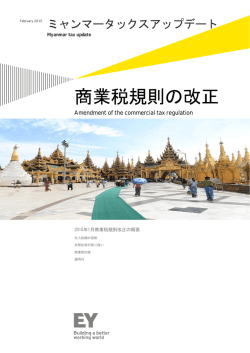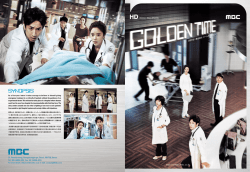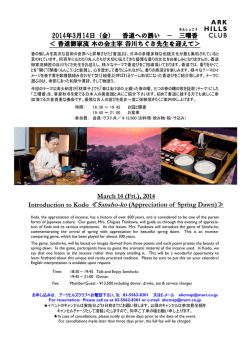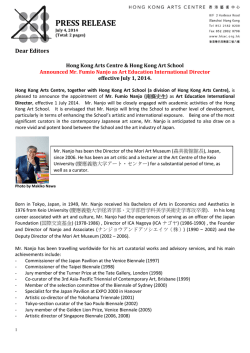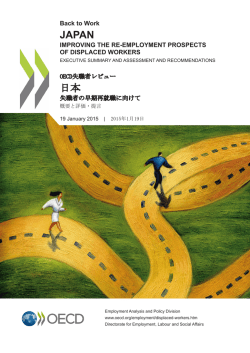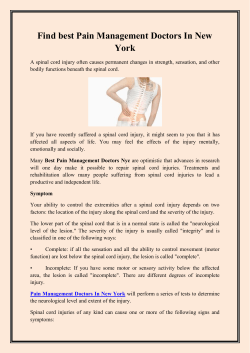
労働安全衛生法の改正 - アンダーソン・毛利・友常法律事務所
October 2014 (No.36) 2014 年 10 月 (No.36) LABOR AND EMPLOYMENT LAW BULLETIN Amendment to the Industrial Safety and Health Act of Japan An amendment to the Industrial Safety and Health Act was made on June 25, 2014. The following are some of the new provisions in the amended Act. These amendments will come into force on the respective dates described below. 1 Employers’ obligation to conduct “stress checks” In light of the rapid increase in the number of recognized work-related mental illnesses, the amendments aim to strengthen companies’ mental health measures by imposing an obligation on employers to have doctors or public health nurses conduct stress checks on regular employees. These checks are an examination aimed at identifying the level of mental stress that employees are under. However, the amendments do not impose an obligation on employees to undergo stress checks. Employers must ensure that each employee that undergoes a stress check is notified of its result directly by the doctor or public health nurse that conducted the check. This notification is expected to inform employees of the level of stress they are under. If requested by an employee, employers must ensure that doctors interview and give any necessary instructions (hereinafter, “Interviews”) to employees who satisfy certain requirements, including those who have been found to be under high stress. The doctors and public health nurses who conduct stress checks are under a confidentiality obligation. Consequently, they must obtain the employee’s consent before the result of the stress check can be disclosed to the employer. In addition, employers cannot treat employees unfavorably because they requested doctors’ Interviews. These obligations are essential to enable employees to comfortably undergo stress checks and encourage employers to establish stress-free working environments. Following an employee’s Interview, the employer must keep a record of the results to get advice from the doctor. This means that employers will be allowed to receive the results of the Interviews from the doctors without the consent of the employee. When necessary, the employer must take measures to improve the employee’s working conditions. These measures will depend on the circumstances of the employee, but may include a change of workplace, change of duties and responsibilities, shortening of working hours or a reduction in late–night work. © Anderson Mori & Tomotsune 2 Although the precise date is yet to be fixed, this amendment will come into force no later than December, 2015. From the date of enforcement, employers with less than 50 regular employees will be released from the above obligations. However, they will be required to comply on a best-effort basis. 2 Promotion of measures against passive smoking For the purpose of protecting workers from passive smoking inside rooms or in other similar environments, employers must use their best efforts to take “appropriate measures” that align with the situation of the employers or their workplaces. “Appropriate measures” may include a total ban on smoking, the installment of smoking rooms or the installation of ventilating fans which can sufficiently reduce cigarette smoke. Small and medium sized employers planning to install smoking rooms will receive a government subsidy of half of the installation expenses, up to a maximum of JPY 2 million. Although this amendment only obliges employers to use their best efforts, the obligation will be expressly prescribed in the relevant law, whereas it was only previously prescribed in the government guidelines. In addition, discussions on a proposal to make the measures obligatory are expected to resume five years after the enforcement of this amendment. This amendment will come into force no later than June, 2015 (the precise date is yet to be fixed). 3 Measures against enterprises that repeatedly cause workers’ accidents The Minister of Health, Labour and Welfare (the “MHLW Minister”) will be able to order an enterprise that has repeatedly caused serious workers’ accidents (i.e., accidents that have resulted in workers’ deaths or disabilities of grade 7 or above) to submit an improvement plan aimed at preventing the recurrence of accidents (a “Safety and Health Improvement Plan”). When preparing a Safety and Health Improvement Plan, an enterprise must hear an opinion of a labor union representing a majority of the workers at the workplace or an employee representing a majority of the workers at the workplace, if no such labor union exists. When a serious workers’ accident threatens to recur at an enterprise that has (a) failed to prepare a Safety and Health Improvement Plan despite an order to do so, (b) failed to amend an inappropriately prepared Safety and Health Improvement Plan despite an order to do so, or (c) failed to follow the Safety and Health Improvement Plan prepared, the MHLW Minister may recommend that the enterprise take measures to prevent recurrence. If the enterprise fails to follow this recommendation, the MHLW Minister may make the name of the enterprise public. © Anderson Mori & Tomotsune 3 This amendment will come into force no later than June, 2015 (the precise date of which is yet to be fixed). 4 The strengthening of systems for controlling chemical substances Enterprises that manufacture or handle chemical substances that have been confirmed to have a hazardous nature will be obliged to carry out a risk assessment (i.e., an examination of the hazard level those chemical substances may cause). Based on the results of the risk assessment, enterprises may be obliged to take necessary measures under the regulations of the Industrial Safety and Health Law. Even when no measures are required under those regulations, enterprises will be obliged to use their best efforts to take necessary measures to protect workers from risks and health problems. This amendment will come into force no later than June 2016, (the precise date is yet to be fixed). 労働安全衛生法の改正 2014 年 6 月 25 日付で、労働安全衛生法が改正されました(同日公布)。主な改正事項は、以 下のとおりです。改正は、以下の各項目に記載した日に施行されます。 1 ストレスチェックの実施の義務付け 精神障害による労災認定件数が激増していることを受け、企業によるメンタルヘルス対策を強化 するため、使用者は、常時使用する労働者のストレスチェック(心理的な負担の程度を把握するた めの検査)を、医師や保健師などに実施させることが義務付けられます。(労働者の側において は、ストレスチェックを受ける義務は課されていません。) 使用者は、検査を実施した医師や保健師などから、検査の結果が、労働者本人に直接通知され るようにしなければなりません。この通知は、労働者が、自分の抱えているストレスの程度を把握す る契機となります。検査の結果、高ストレスとされた者など一定の要件に該当する労働者から申し 出があった場合、使用者は、医師による面接指導を行わなければなりません。 ストレスチェックを実施した医師や保健師には守秘義務が課されており、検査実施者から検査の 結果を使用者に知らさるためには、労働者本人の同意が必要です。また、労働者が面接指導の 申し出をしたことを理由として、使用者がその労働者に対し、不利益な取扱いをすることは、禁止さ れます。いずれも、労働者が安心してストレスチェックを受けることができるようにし、使用者がスト レスの少ない職場環境を整えていくために、重要な点です。 使用者は、面接指導の結果を記録するとともに、医師の意見を聴き、必要に応じ、労働者の実情 を考慮のうえ、就業上の措置を講じる義務があります。したがって、面接指導の結果については、 使用者は、労働者の同意なく、医師から入手することができます。使用者が講じる就業上の措置 には、たとえば、就業場所の変更、作業内容の変更、労働時間の短縮や深夜勤務回数の減少な どが含まれます。 © Anderson Mori & Tomotsune 4 本改正は、2015 年 12 月までに施行される予定です。(施行日未定)なお、常時使用する労働者 数が 50 人未満の事業場については、本項目で記載した使用者の義務は、当分の間、努力義務 にとどまります。 2 受動喫煙防止対策の推進 使用者は、室内またはこれに準ずる環境下で、労働者の受動喫煙を防止するため、使用者およ び事業場の実情に応じた「適切な措置」を講じる努力義務を課されます。「適切な措置」には、た とえば、全面禁煙、喫煙室の設置、換気扇の設置(たばこの煙を十分に低減できるもの)がありま す。 今回の改正では、使用者の義務は「努力義務」にとどまりましたが、従来は指針で定められていた 義務が法律に明記され、また、施行から 5 年後には、受動喫煙対策の義務化が再度検討される 見込みです。 中小企業の事業者が喫煙室の設置などをする場合、上限を 200 万円として、設置費用の 2 分の 1 が国から助成されます。 本改正は、2015 年 6 月までに施行される予定です。(施行日未定) 3 労働災害を繰り返す企業への対応 厚生労働大臣は、重大な労働災害が繰り返し発生している企業に対し、再発防止のため、改善 計画(特別安全衛生改善計画)を作成して提出するよう、指示できるようになります。「重大な労 働災害」は、現時点では、死亡災害や障害等級 7 級以上に相当する労働災害が想定されていま す。 特別安全衛生改善計画は、労働者代表(事業場に労働者の過半数で組織する労働組合がある 場合はその労働組合、ない場合は当該事業場の労働者の過半数代表者)の意見を聴いて作成 しなければなりません。 指示された計画が作成されない場合や、作成された計画が不適切で変更を指示されたにもかか わらず変更しない場合、および、計画が守られていない場合において、重大な労働災害の再発の おそれがあるとき、厚生労働大臣は、再発防止措置を採るよう勧告することができます。勧告に従 わない場合、厚生労働大臣は、企業名を公表することができます。 本改正は、2015 年 6 月までに施行される予定です。(施行日未定) 4 化学物質管理体制の強化 一定の危険性・有害性が確認されている化学物質を製造し、または取り扱う事業者は、リスクアセ スメント(それらの化学物質による危険性・有害性等の調査)を実施する義務が課されます。 リスクアセスメントの結果に基づき、事業者は、労働安全衛生法令に規定がある場合はそれらの 規定に基づく措置を講じる義務があります。それらの規定がない場合でも、労働者の危険や健康 障害を防止するため、事業者は、必要な措置を講じる努力義務を負います。 © Anderson Mori & Tomotsune 5 本改正は、2016 年 6 月までに施行される予定です。(施行日未定) © Anderson Mori & Tomotsune 6 This law bulletin is published as a general service to clients and friends and does not constitute legal advice. Should you wish to receive further information regarding the above-mentioned matters, and/or wish to consult as to whether your company is in compliance with labor/employment law, please contact: 本ニュースレターの内容は、一般的な情報提供であり、具体的な法的アドバイスではありません。 お問い合わせ等ございましたら、以下の執筆弁護士までご連絡下さいますようお願い申し上げます。 Kazutoshi Kakuyama/角山 一俊 (パートナー) Direct: 81-3-6888-1036/Email: - Hideki Thurgood Kano/嘉納 英樹 (パートナー) Direct: 81-3-6888-1061/Email: -law.com Yukiko Imazu/今津 幸子 (パートナー) Direct: 81-3-6888-1063/Email: - Nobuhito Sawasaki/沢崎 敦一 (パートナー) Direct: 81-3-6888-1102/Email: Yuhki Tanaka/田中 勇気(パートナー) Direct: 81-3-6888-1173/Email: - CONTACT INFORMATION アンダーソン・毛利・友常法律事務所 〒107-0051 東京都港区元赤坂一丁目 2 番 7 号 赤坂Kタワー22 階(総合受付) Tel: Email: URL: 03-6888-1000 (代表) http://www.amt-law.com/ © Anderson Mori & Tomotsune
© Copyright 2026
